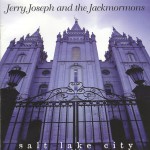 Jerry Joseph and the Jackmormons
Jerry Joseph and the Jackmormons
Salt Lake City
Holladay Records
If there were justice in the world of Rocknroll, certainly Jerry Joseph would have received the acclaim he so genuinely deserves. Since arriving in Portland in the early ’90s with his band Little Women, after a long stint on the road, traveling throughout the West— Jerry has established himself as a talented performer and a solid songwriter. There is no doubt that he has lived the requisite lifestyle. His songs are littered with the dramas and melodramas such a hardscrabble existence inherently produces.
Seemingly commuting between here and Utah, Jerry enters his third year with the Jackmormons, the membership of which consists of bassist, Junior, and a few different drummers, the most recent being Brad Rosen, who plays on the four newer tunes. Keyboardist Dave Pellicciarro, who shows up on about half the tracks, appears not to be with the band anymore. This recording contains cuts culled from all the various configurations. Four of the tracks were released as part of an EP, Cotton, which was reviewed in these pages eighteen months ago.
Each of the thirteen songs in this compilation bears the stark mark of Jerry’s bleak lyrical perspective, liberally laced with his raw, bluesy delivery and stripped down approach to an arrangement. But it is his poet’s eye for detail that sets Joseph apart from most of his counterparts. He shares with Graham Parker, John Hiatt, John Mellencamp, Bruce Springsteen and Elvis Costello the ability to create for himself a well-defined personae amidst the human wreckage which pervades the wasteland contained within his songs.
“Chinese Balls” maintains a slight stylistic change that was first noted on Cotton.. The addition of Pellicciarro’s jazzy open chords on the piano in the verses and chiming organ in the choruses lends Joseph’s gentle tune subtle r&b flavors that enhance the the basic structure of the song, stretching the boundaries just a little bit. Treading more familiar ground, “Grateful” is driven by Jerry’s electric guitar leads. This too is a new twist for Joseph. For the most part, his leads are interesting, though he needs to think about when and when not to play. Too often Jerry can be heard noodling away in the background; filling up sonic space without a lot to say. Developing the arrangements of his lead parts would add to their effectiveness.
Lyrically, Jerry’s songs seem dominated by the world view of the junkie, reformed and otherwise. “Grateful” paints a cynical view of the former animal: “Serene, eyes blank, you say you’re thankful/But you don’t know who to thank/Thank God, he’s good/He turned you from/ A junky to a piece of wood.”
“Get Down” is harrowing in a way that’s similar that Hubert Selby’s black vision of the human race, Last Exit To Brooklyn. “So baby don’t pretend you care/Like climbing mountains cause they’re there/You don’t need to learn to feel/By tomorrow it won’t be real/I don’t need to know your name/Every junky fucks the same/But we need something to do/So I guess it’s me and you…/And get down.”
The title track, which is the final song, and the first number, “Welcome To The Other 95% Of The World,” keenly illustrate Jerry’s ambivalence toward those who populate the Mormon world of “Salt Lake City.” “Chiva, soda, chiva, a message to you from Jesus/Days like these I get them both confused/Missionaries and Mexican drug dealers/It’s all in the language that you use.” Elsewhere he says, “There’s a city of angels, there’s a city of lights/This is the city of vacant looks, questionable gods and multiple wives.”
But the most transcendent song amongst the baker’s dozen is “Fiona,” wherein Jerry comes to grips with the loss of a relationship that perhaps was never meant to be in the first place. His layers of acoustic and electric guitars (one of which utilizes a wah-wah to create a sort of didjeridoo effect). A pretty lead guitar line is woven into the catchy chorus. An inspired performance.
It’s a dreary landscape that Jerry Joseph explores with the Jackmormons, not one that would appeal to everyone. It’s the world of endless gray days, inhabited by zealots and addicts and those who oscillate between the two extremes: where drugs and religion represent the same human need and animal compulsion. The lines between righteousness and perdition become blurred. If you’re looking for a road map around this landscape, Jerry has one in his hip pocket.
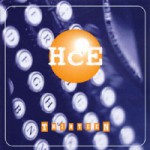 Here Comes Everybody
Here Comes Everybody
Thirteen
Refrigerator Records
Michael Jarmer and René Ormae-Jarmer have been together as a band for thirteen years now, hence the title of this compilation. Michael’s lyrical fascination with anecdotal wordplay is immediately demonstrated by the fact that he chose an obscure reference to a character in James Joyce’s’ most cryptic novel. Literary aspirations aside, Michael and René have maintained a high level of musicianship throughout the years, employing the services of numerous guitarists, bassists and even a drummer or two, despite the fact that both of the Jarmers are fine drummers themselves.
With the exception of a few remakes, tracks from all of their seven releases are represented here, pretty much in chronological order— offering a good overview of the evolution of HCE over the years. For what began as a techno sort of project with mechanical drum patterns and ornately sequenced keyboard filigrees, has undergone a transformation, becoming a much more organic ensemble, coloring their presentations with acoustic piano and various organ tones.
The first three songs on the menu are the most recent recordings, though they are new renditions of old material created by the current line-up, which includes René on keyboards, Michael on drums and long time bassist David Gilde. These are stripped down versions, far away from the layered sound of former times, though the Jarmers’ penchant for polyrhythms and odd-time signatures seems to remain intact with the idiosyncratic “Social Cracker,” one of the band’s most successful numbers from the early days. It would take a mathematician to ascertain the time signature in the verses. Michael’s syncopated accents on the snare add to the confusion.
But the interesting track among the new ones is “Things We Bury,” remade from the version depicted on 1994’s Hump Day. Here, Gilde throws down a hard-walkin’ bassline over Michael’s stuttering drums, as René applies an ethereal keyboard line, perhaps inspired by John Lennon’s mellotron on the Beatles’ “Strawberry Fields Forever.” Michael sings “When it dies you bury it/In your subconscious yard/You wait until it’s time/So no one can see you.” The arrangement turns strident at the turnaround with René adding dramatically jagged piano punches; neat classical flourishes in the chorus.
Of the archival material, several HCE highpoints are revisited, including “Blue Refrigerator” from ’87s Brand New Species.— where guitarist Greg Kirkelie (who later went on to play for several years with On A Llama) adds delicate textures to the mix. “Tell Me If You Can Hear Me” is reminiscent of middle-period Police in some respects, as Kirkelie contributes Andy Summersish flavors to the instrumental stew.
Five songs are sluiced from one of HCE’s best albums, Wake, from 1991. At that point, bassist John Huckfeldt (also of Gravelpit) had joined the fold with the Jarmers and Kirkelie creating a formidable group of players. The material was up to the test, with several memorable tunes coming out of that period. Among the finest is the winsome “Happy,” a tune that shares some structural similarities to songs from the Police’s Ghosts In The Machine. Over rolling piano arpeggios and Tears For Fears-like synth punctuations, Michael executes one of his most affecting choruses. “She’s So Complicated” plays René’s toy piano figure against Huckfeldt’s funky bass thump, creating a Bowiesque mood, over which Michael chants in an Adrian Belew-ish tenor.
Gilde took over the bass position from Huckfeldt in 1993. He was joined by Jeff Bryner, who replaced Kirkelie on guitar. Bryner brought a more flexible style to HCE, lending the band a richer palette of colors from which to choose. While the material on the subsequent albums on which he played was less accessible, his presence made the songs more adventurous.
It’s been a long, strange trip for the quirky, uncompromising HCE. Michael Jarmer’s snotty intellectuality has always veered dangerously close to antisocial snobbishness. But, taken as a whole, the band’s work shows a consistent sense of humor that deflates somewhat the hostility. And the constant high level of musicianship cannot be disputed. HCE are not an easy band to love. Still, a deeper exploration of their extensive catalog is sure offer rich rewards.
 Plaid Pantry Project
Plaid Pantry Project
Hits From The Service Industry
Catnip Records
You know, it takes a lot of balls, to attempt to reproduce (update might be a better word) Gary Burden’s cover for On The Beach, from 1974— one of Neil Young’s most desolate early albums. But it also takes real reverence to capture little details, like the coat hanger and the can of Coors; while sneaking new product placement into the picture at the same time. And it requires, unless one is totally ignorant, a real commitment to the devastating honesty of the original recording to even bother to do such a thing in the first place. Andy Pribhol has proven himself up to the task, in spirit, if not entirely in execution.
We last caught Andy about two years ago with the PPP release Middle Of The Road. Back then, Andy was Plaid Pantry Project, playing all the instruments on all the songs he wrote and sang. For this outing he assembled a band to help on about half the songs, the other half he maintained his DIY approach. The numbers with the full band certainly generate more sound and fury, but some of the solo ventures work well too.
The first half of the album is a true tour de force, with nary a misstep. “Paul Westerberg” a wary tribute to the irreplaceable Replacement, veers between cynicism and veneration, but ends on the positive: “Do you know how you make me feel//Blazing through life so damn real.” The band crunches mightily with Andy and Bryan Ronshaugen providing hard driving guitars over the rhythm section of bassist Joey Williams and whipsmart drummer Matt Terrerri, creating a sound closer to the Foo Fighters than the Minnesota boys, but incorporating elements of both. Well done.
“10,000 T-Shirts” coasts on Ronshaugen’s indelible lead line as Andy intones in a low Lou Reed moan a tale of a lost opportunity for interpersonal connection. Another keeper. “Allegro” would appear to be leveling a broadside at another band or band member, “Here comes that butt rock’n attitude of bands. Again/Buy your lighters and light ’em up— up over your head/Every time we laugh about it/ We lift our hands and salute this way/Fly the bird high.” Jagged guitars and spitfire drums propel the song through slick changes. A good song. Coincidentally, there was a band around town called Allegro. One wonders if the song is about them perhaps?
Andy goes solo on the memorable “Joe.” As one electric guitar chords over a liquid bassline, another electric vibratos a moaning solo, álà Neil Young. Andy’s song is closer to something Frank Black might have done in the past ten years, apparently recounting some experience our protagonist may or may not have had at one of The Big Stinks. “Danny Elfman” pays homage to the leader of Oingo Boingo, earnestly copping some of the maniacal tension Elfman often captured with his band.
But the best of the bunch is “Handycap.” Over a dark, stuttering guitar figure, reminiscent of two other Andys, Partridge and Summers, Pribhol deftly sketches the shades of horror attendant in the discovery that one may have a life threatening disease. He again addresses the issue from a more cynical stance on “Gobi.” But here, with a great sense of urgency, Andy describes, quite eloquently, the flights of desperation and fantasy that crowd the mind of one who has been condemned by a doctor to a slow, helpless death. The agonized chorus matches Dave Grohl’s best work, except that the lyrics are more focused here. A powerful song.
Of the remaining six songs, “Summer” and “Gobi” stand out as memorable. “Abby Road” and “Wait Till/You Will” fall short of the high standards set forth, but have things of interest about them. “Harboring A Secret” probably doesn’t make as much out of a great title as it should have. But Pribhol’s songs are generally not so concerned with mechanical songwriting conundrums as with the expression of feelings, emotions and ideas. Still, that’s a song title for the ages.
Andy Pribhol is up for the challenge he presents himself with a daringly sarcastic album cover— creating a record that shows distinct artistic growth since his last effort. Having already cleared the corporate hurdle created by the name Plaid Panty Project, he generates more gentle, low-key controversy with this production, guaranteeing that this shrewd and talented young man will be heard from well into the 21st century.
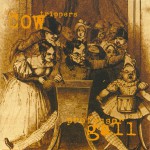 The Cow Trippers
The Cow Trippers
Professor Gall
BEW Management
Porcelain God rocked Portland in the mid-90s with their own curious brand of funked up grunge. Guitarist extrordinaire Drew Norman, vocalist Billy McPhee and bassist Will Youngman maintained a fiercely loyal following throughout their tenure on the local stages. Now, having matured and improved together and with other bands over the past couple of years, the trio has reunited to form the foundation of the Cow Trippers. They are a band of schizophrenic tendencies, but adept enough to pull off most of their varied musical excursions..
Stylistically, though most of the music is composed by Norman, the attitude and tenor of each song seems to be largely dependent upon whom among the three wrote the lyrics. While Drew tends to write songs that cerebrate and ponder, McPhee tends to lean more toward stream-of conscious emotionalism and a certain fixation with Elvis. Youngman’s lyrics are filled with anger, cynicism and images of violence and death— beneath which lurks a deeply personal search for identity.It’s kind of an odd composite of fairly intelligent and mostly well thought out ideas, that is held together, primarily, by Norman’s considerable abilities as a guitarist.
Youngman’s songs “Keep Your Panties On,” “Awake” and “Still praise This God For Something” lead the album off in a strange slightly twisted direction, with hard-driving metalized arrangements. “Awake” changes gears at first with a slow moody build up, before launching into the main body of the song. Norman’s brilliant, molten solo propels the piece into the stratosphere.
Drew’s “A Dog Should Always Have A Few Fleas” maintains the determined shred factor, while delineating the history of Franz Joseph Gall, the Father of Phenology (essentially the psuedoscience surrounding the assessment of intelligence and personality traits via measurement of the shape of the skull). Interesting subject matter, to say the least. His “Take Back Your Mink” changes gears dramatically, a smoky jazz number, tinged with interludes of chaotic menace. Pretty cool.
Norman gives McPhee’s “Mad Cow” a gearloose, erzatz country arrangement, with banjo and jew’s harp acoutrements, that lighten the mood considerably. Meanwhile “Worms” takes a more straight-ahead approach, with something closer to a pop sensibility. “Shadows” is a hard waltz through tortuous lyrical rapids. “Penny Wine” starts off with a chunky groove, nicely interwoven with Norman’s jangly guitar and Youngman’s slippery bassline. The song degenerates in the choruses, where McPhee channels Bobcat Goldthwaite.
Youngman deposits two more chunks of spleen near the end of the album. “Changes” drips with rage and psychic confusion. McPhee captures the snarled and disturbed bafflement of the lyric with a frenetic vocal. “I Killed The Walrus,” incorporates some seriously inventive riffage over an inane set of words that would appear to glorify and condone the murder of John Lennon, while ignorantly attributing Paul McCartney’s “Blackbird” to the dead Beatle. By comparison, Charles Manson had a better idea of what he was talking about. Now that’s credibility!
The Cow Trippers are fine musicians, Youngman and drummer Eric Bluhm form sinuous rhythmic muscle. McPhee is a capable singer who does as much as he can, given the widely varying degrees of antisocial viewpoints he must purvey, And Drew Norman would seem to have complete command of the guitar, knocking of savage riffs and smart, sophisticated leads at the drop of a pick. A couple of the songs on this outing come together pretty well, though oddly enough, they seem to be the “novelty’ songs, such as “Take Back Your Mink,” Worms” and “Mad Cow,’ where a sly sense of humor shines through the angst.
The rest of the material is well-crafted and probably generates quite a fury in a live setting, where the words are mostly unintelligible anyway. In the recorded format they stand out more distinctly, with the vocals up in the mix; especially so when the lyrics are printed in the CD insert. And it is in that area where The Cow Trippers still fall a little short of the mark they most likely hope to achieve. As a band they are capable enough of working their way out of even that minor difficulty.
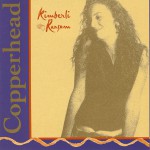 Kimberli Ransom
Kimberli Ransom
Copperhead
Hair On Fire Records
Warm and intimate songs sung carefully and earnestly, at different times resonating of Laura Nyro, Joni Mitchell, Karla Bonoff and Jewell. Pleasant. Harmless. Well-meaning and introspective, but often uninspired and listless. “This House” is nice, aiming at a Tori Amos-like sense of drama. Ransom’s haunting piano phrases are accented by a mournful cello, as she sings with an emotive contralto a tale about tormented roommates.
Because she is a solo folk singer, Kimberli Ransom purposely chose to offer stripped down arrangements of her songs, which are typically little stories about the cascading array of events. Her music is honest, unadorned and simple, warm as a cup of cammomile tea on a rainy January day.
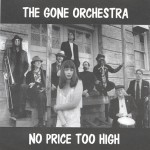 The Gone Orchestra
The Gone Orchestra
No Price Too High
Self-Produced
Right on both counts. Gone Orchestra is no misnomer. These cats are way past gone. Beyond lost. They’s stoned immaculate! And singer Jamie Price is, well… priceless, with a voice like Helen Humes and Billie Holliday. This talented gem of a singer splits the bill with the musique concrête musings of Mr. Smegma to you, Mike Lastra and orchestra: comprised of nine or ten other musical hooligans.
The combination of the two disparate idioms can sometimes sound like a vinyl album that has been left in the sun, lending a rubbery slur to the entire proceedings. Other times it sounds as if the cops are banging at the door while you’re listening to some blues songstress on an archival recording. Then there are the pieces that sound like a microphone was packed in Jello, pastiches which sound as if a thousand oven racks were thrown out into the front yard: others as though Stravinsky’s Firebird lost a wing and crashed with a tumultuous explosion.
Jamie Price makes the most of her three opportunities to knock out a vintage tune here and there between the revolution (#9). That this band is hard to figure out is an understatement and probably goes without saying. Experimental as the gentetic splicing of a potato, a car door and a raindrop. Cacaphonous as the sound of one hand clapping. Surreal as I-5 at rush hour, dusted with a fine layer of snow, doused with gasoline. They ain’t gone at all. They just returned way too soon man, way too soon.
